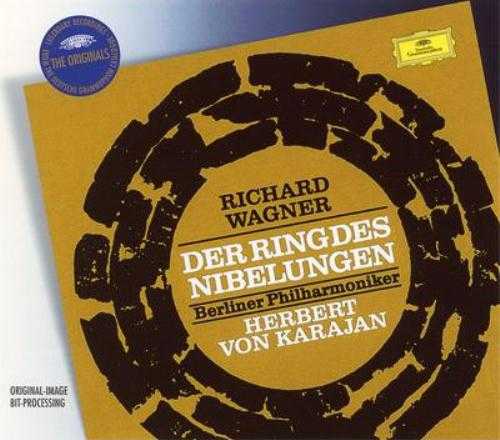
Composer: Richard Wagner
Performer: Dietrich Fischer-Dieskau, Thomas Stewart, Gerhard Stolze, Zoltan Kelemen, Helga Dernesch, Berlin Deutsche Oper Chorus
Orchestra: Berlin Philharmonic Orchestra
Conductor: Herbert von Karajan
Audio CD
Number of Discs: 14 CD box set
Format: APE (image+cue)
Label: Deutsche Grammophon
Size: 3.89 GB
Recovery: +3%
Scan: no
CD 01-02: Das Rheingold
CD 03-06: Die Walkure
CD 07-10: Siegfried
CD 11-14: Gotterdammerung
karajan_bpo_wagner_der_ring_des_nibelungen02.rar – 303.6 MB
karajan_bpo_wagner_der_ring_des_nibelungen03.rar – 290.1 MB
karajan_bpo_wagner_der_ring_des_nibelungen04.rar – 231.2 MB
karajan_bpo_wagner_der_ring_des_nibelungen05.rar – 198.3 MB
karajan_bpo_wagner_der_ring_des_nibelungen06.rar – 346.2 MB
karajan_bpo_wagner_der_ring_des_nibelungen07.rar – 260.3 MB
karajan_bpo_wagner_der_ring_des_nibelungen08.rar – 307.5 MB
karajan_bpo_wagner_der_ring_des_nibelungen09.rar – 285.9 MB
karajan_bpo_wagner_der_ring_des_nibelungen10.rar – 272.8 MB
karajan_bpo_wagner_der_ring_des_nibelungen11.rar – 297.7 MB
karajan_bpo_wagner_der_ring_des_nibelungen12.rar – 269.9 MB
karajan_bpo_wagner_der_ring_des_nibelungen13.rar – 372.9 MB
karajan_bpo_wagner_der_ring_des_nibelungen14.rar – 332.3 MB
A NEW/OLD FRIEND.
When this set came out in the 1960’s, it was reviewed extensively, and sounded interesting. I was moving about then, from job to school and new jobs. Although I was an avid collector, I could not justify purchasing another Ring, especially since I was mostly satisfied with the Solti recordings. For those who had no experience with Vinyl LP’s, a RING set was a huge item to lug around and store.
Recently, I decided to really study the RING, its music and libretto. After 50+ years of this music, I asked myself: “do you really know what’s going on here?”
Too much print and blog space, lately, have been taken up with hissy fit arguments about various productions, both on stage and on Video.
Therefore, I decided to eliminate visuals, and returned to audio only. Furthermore I wanted A RING, I’d never heard before. So, I tried the Karajan RING. The reviews I read over the years, if they could find little that was positive, still complimented Karajan for the clarity of his conducting. This turned out to be perfect for a fresh look at the RING.
Having now heard all four operas, I agree with the comments on clarity. I was also taken with the way the singers were fully integrated into the orchestral reading. Most of the cast had been working with Karajan on the RING in his Salzburg productions. This was not a random collection of more or less Wagner singers coming in and out of the studio. (or, sadly, in live performances, which is very common today). If Karajan was a dictator, as often said, the singers, come off as loyal troops.
Yes, the cast. Two Wotans, two Brunnhildes, and 3 Tenors (yep, count ’em, three tenors). Most reviewers had criticized Fischer-Dieskau as the Rheingold Wotan. My take is that he was both too much and too little for the part. His great skill as a lieder singer is wasted on the Rheingold Wotan. The part is very direct. Wotan is a young, confident god, whose command of the situation is already slipping before the curtain opens. He exercises power full blast, and has to step on many “toads” besides Alberich. Nothing subtle here. Fischer-Dieskau’s voice also does not contrast well with other male characters in most scenes.
Thomas Stewart was a real “find” for me. Initially, in Walkure, he seems a tad lite, but as the opera progresses he takes on weight and gravitas both in singing and declamation. Everybody and his/her brother has to repeat the mantra about how sleep-inducing Wotan’s long Act II narratives are. You may nod off in the opera house or skip the tracks on your CD, but missing Wotan opening his soul to Brunnhilde, is missing the greater thread of the saga. In these scenes, Wagner is telling us the direction he is taking this tale. Stewart is magnificent here. At times he is almost whispering, yet fully musical. The effect he and Karajan achieve is riveting. Although their voices and personas are different, Stewart, here, is on a plateau with Hans Hotter. He shows strain as The Wanderer (This was recorded several years after Die Walkure) but is still highly effective.
Regine Crespin was, reportedly, Karajan’s favorite Brunnhilde, at least for Die Walkure. Her voice is lovely and big enough for the part. I look forward to hearing her in this recording many times over. It is nice to hear a Valkyrie who is not trying to outgun Nilsson (a sure-fire way to end your singing career!)
Helga Dernesch was maestro K’s choice for the last two Brunnhildes. I had never heard her in any role before. I often read that she had a good strong voice, but had no idea what the character was all about. (in reference to her recording with Karajan of Tristan und Isolde). To me ,she is consistently forceful, both in passion and in anger. She does come on, at times, like gangbusters. This would be a problem if her voice quality was not so rock solid. She reminds me of Marjorie Lawrence from the 1930’s and early 1940’s at the Metropolitan Opera. (this is documented by broadcasts recently released by Sony and the Met). Lawrence was often described as having an aggressive personality, great for all the Brunnhildes, but too much for Sieglinde. The same comments apply to Helga Dernesch, in my view.
And now, THE THREE TENORS! Siegmund was considered John Vickers’ greatest role. I had heard him on a Met Broadcast in the early 1960’s and later an RCA complete Walkure under Leinsdorf. (this “stand alone” set I recently bought on Amazon at a ridiculously low price, grab it before it again vanishes into recorded limbo!). Here and there, reviewers found his Siegmund with Karajan to be the best of the bunch. They were not kidding. Vickers is absolutely electrifying!!! What we have in this recording is a Siegmund for ANY golden age.
After hearing Vickers, the other tenors are doomed to be considered letdowns. This is, in a way, Vickers’ doing. He never wanted to do Siegfried.The Young Siegfried (as the opera was originally called) is Jess Thomas. I had always read comments about him, which, at best, damned him by faint praise. Paul Jackson, author of “Saturday Afternoons at the Old Met” generally gives him an “E” for effort, nothing much more. So, I was prepared for the worst. Not quite! He does have a lighter voice, closer to Windgassen than Vickers. He seems to be in the spirit of the young hero. To me, his performance is very good. I suspect that this studio recording shows him in better stead than hearing him live at the cavernous Old Met or the cavernous New Met.
Helge Brilioth, a Swedish tenor, also a relatively light voice, carries the mature Siegfried quite well. Again, like Thomas, he may come off better in a studio recording or a European Opera House. He was only in New York briefly. Reportedly, he ended his singing career prematurely for personal reasons. I’ve never heard him in any other recordings.
Another consistent criticism of this recording was the casting of Gundula Janowitz, as Sieglinde. She was, reportedly, a Mozartean specialst. Her voice here is that of a lyric soprano, and has a very sweet sound. She understands her part well.In Act II Sieglinde is alone and frightened, half dreaming she is a little girl, crying for her father and brother, as her mother is killed. The effect is heartrending. No miscast here. After all, does Sieglinde always have to be a moonlighting Brunnhilde?
And, EVERYBODY LIKES THE GIANTS! Karl Ridderbusch and Marti Talvela are absolutely the best team since Willy Mays and Bobby Thompson! (Sorry, I couldn’t resist a pun, here.)
The other parts are uniformly well-handled.
Now, a word about “chamber opera”. I’m not sure what exactly reviewers mean as they repeatedly apply this to Karajan’s Ring. As far as this non-professional, non-instrumentalist can see, this may refer a certain modification of dynamics and tempi to integrate a cast of relatively light-voiced singers. If that is so, these performances are the better for it. There is beautiful clarity and balance throughout. I hear things I never heard before in this recording. Wagner’s orchestration is just a voyage of endless discovery. And, when there are no singers to drown out, there is plenty of sturm und drang.
Finally the sound is good to very good, late 60’s stereo. There is some “shattering” on ultra loud passages. And the first few minutes of the Rheingold prelude indicates a very muddy river. A modern remastering from prime sources could fix these minor annoyances. Given the state of the classical record business today, this is doubtful.
Packaging is good. Four seperate boxes with good notes, and individual, readable librettos.
Enjoy! Learn! and Profit!
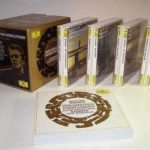
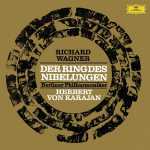
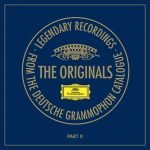
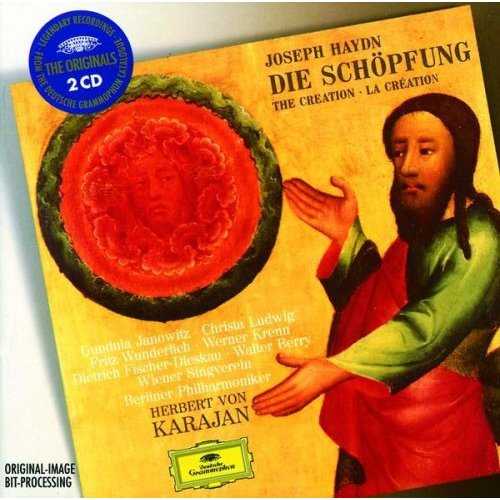
Thanks
great post, thanks!
Thank you!!!!! :)
Thanks you !
Great record! Many thanks!!
-_*
Great record! Many thanks